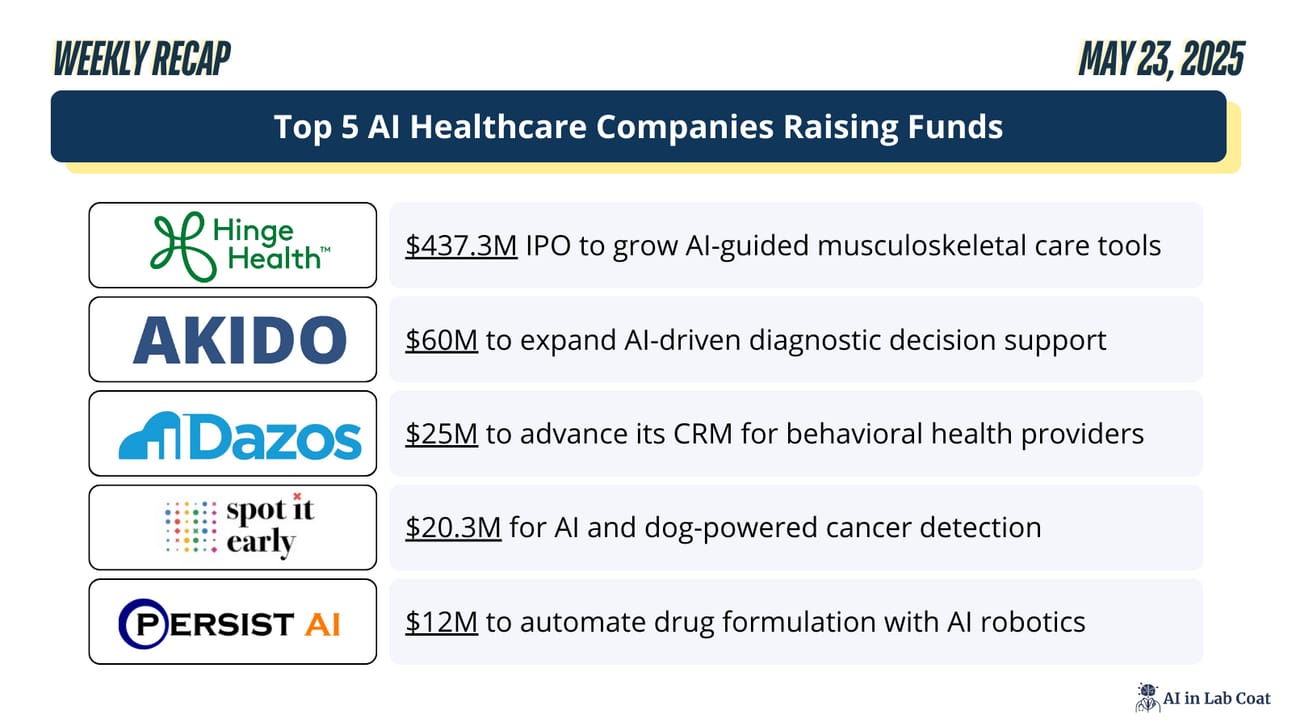
Happy Friday! It’s May 23rd.
Israeli startup SpotitEarly has launched in the U.S. with a unique cancer screening tool that combines AI and trained dogs to detect cancer!
How it works is the patient breathes into a special mask for three minutes, and trained dogs sniff the sample for cancer-linked compounds. The AI platform tracks each dog’s behavioral and physiological signals in real time.
At an incredible 94% accuracy in their trial, this is the first time I’ve seen “multimodal” AI taken to another level!
Our picks for the week:
Featured Research: AI Blood Test for Pancreatic Cancer
Perspectives: Finding Hidden Risks in Records
Product Pipeline: Microbial Data Powers Skincare
Policy & Ethics: EU AI Act vs Medical Devices
Read Time: 5.5 minutes
FEATURED RESEARCH
AI Blood Test Detects Early Treatment Response in Pancreatic Cancer

Pancreatic cancer is the most deadly form of cancer, partly because it's typically caught late, when the treatment is least effective.
Only about 12% of patients survive five years after diagnosis, and existing methods, such as CT scans, typically take months to show whether treatments are working or not.
AI offers faster answers: Researchers at Johns Hopkins Kimmel Cancer Center developed a new blood test called ARTEMIS-DELFI.
Using AI, this test rapidly analyzes small fragments of tumor DNA circulating in blood, and accurately detects if treatments are working as early as four weeks into therapy.
More accurate than imaging: In two clinical trials involving pancreatic cancer patients, ARTEMIS-DELFI outperformed traditional methods.
It accurately identified treatment responders and non-responders earlier, potentially allowing doctors to switch from ineffective treatments to more effective alternatives.
Patients classified as responders survived significantly longer (233 days vs. 172 days) than non-responders.
Why it matters: Senior author Dr. Victor Velculescu says this rapid “fast-fail” method can dramatically improve patient outcomes.
With earlier insights into therapy effectiveness, doctors can rapidly adapt treatments, offering better survival chances or patients.
The next steps involve confirming ARTEMIS-DELFI’s clinical benefits in larger studies, potentially offering care not just for pancreatic cancer, but other challenging cancers as well.
For more details: Full Article
Brain Booster
As of 2024, where does pancreatic cancer rank among cancer-related deaths in the United States?
Select the right answer! (See explanation below)
Opinion and Perspectives
HOSPITAL ADMISSION
Hospitals May Soon Use AI to Prevent Spread of Drug-Resistant Bacteria
With an aging population, hospitals are looking to quickly identify patients who have stayed in long-term care facilities (LTCFs). This is because nearly half of LTCF residents carry antibiotic-resistant bacteria, increasing the risk of spreading infections once they’re hospitalized.
The key problem is that vital information about recent LTCF stays is often hidden within detailed, free-text admission notes, making it difficult and time-consuming for hospital staff to find.
AI Offers a Faster, Cheaper Solution: Research led by Dr. Kerri Goodman from the University of Maryland and Johns Hopkins looked into whether AI could accurately identify these high-risk patients and found that the results were promising.
The AI model analyzed hospital admission notes as accurately as human reviewers, significantly faster and at a fraction of the cost.
Human reviewers typically spent about 2.5 minutes per patient note, at an estimated cost of $0.83 each. In comparison, the AI method took roughly five seconds per note, costing only $0.03, over 20 times cheaper and approximately 25 times faster than manual reviews.
A Clear Path Forward: It’s not just about speed and cost, AI also caught things human reviewers missed, so it’s more reliable and safer for patients.
Goodman and colleagues say this isn’t just about efficiency. It’s about identifying vulnerable patients to prevent hospital acquired infections.
For more details: Full Article
Top Funded Startups
Product Pipeline
SKIN MICROBIOME
Concerto Builds AI Engine from Massive Dataset to Target Acne, Eczema, and More
Concerto Biosciences has completed the data-gathering phase of the Skin Universe Project (SUP), compiling over 33 million datapoints from microbial interaction experiments to map how skin microbes influence one another.
Using its high-throughput kChip platform, Concerto tested millions of microbe combinations linked to conditions like eczema, acne, wounds, and malodor, uncovering how secreted molecules shape skin health.
SUP powers the company’s AI engine, kAI, which predicts effective microbial combinations for new therapeutics and consumer products.
This dataset brings Concerto a step closer to designing precision microbial treatments, targeting pathogens while preserving beneficial bacteria, for both clinical and personal care use.
For more details: Full Article
Policy and Ethics
EU AI ACT
How the EU AI Act Is Complicating Medical Device Compliance

The EU’s AI Act is adding serious layers of complexity for anyone making AI-based medical devices.
Manufacturers now need to meet both the AI Act and existing Medical Device Regulations, which often overlap but don’t always align, especially around clinical investigations.
Ethical concerns like data bias, human oversight, and rights protections are now front and center. On top of that, delays in Notified Body approvals and missing harmonised standards could seriously slow down product launches.
For healthcare professionals, this could mean delayed access to new AI tools, with potential ripple effects on patient care and innovation in clinical settings.
For more details: Full Article
Byte-Sized Break
📢 Three Things AI Did This Week
A federal judge rejected Character.AI’s argument that its chatbots have First Amendment rights, allowing a wrongful death lawsuit over a teen’s suicide allegedly influenced by the AI to proceed. [Link]
Nvidia CEO Jensen Huang praised the Trump administration's plan to ease AI chip export curbs, criticizing the previous Biden-era restrictions for slashing Nvidia's China market share from 95% to 50% and causing up to $15 billion in revenue losses. [Link]
The Chicago Sun-Times published a summer reading list with 66% fake, AI-generated book titles, prompting King Features Syndicate to cut ties with freelance creator Marco Buscaglia for violating its no-AI policy. [Link]
Have a Great Weekend!

❤️ Help us create something you'll love—tell us what matters!
💬 We read all of your replies, comments, and questions.
👉 See you all next week! - Bauris
Trivia Answer: B. 3rd
Pancreatic cancer ranks as the third leading cause of cancer-related deaths in the U.S., following lung and colorectal cancers. Its high mortality rate is attributed to late diagnosis and limited treatment options.




